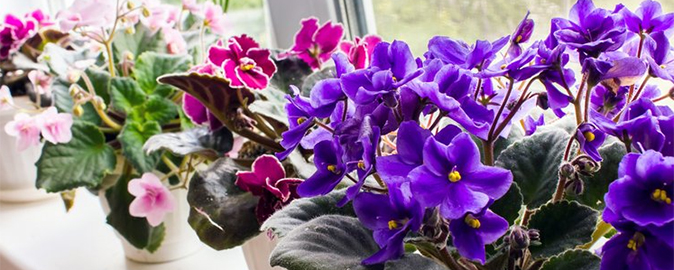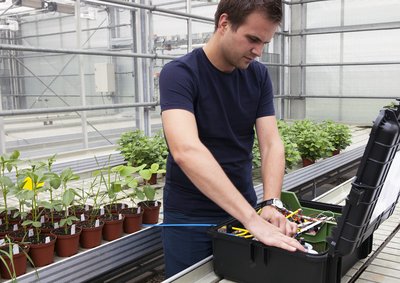We hope your potted plant had a safe journey
Every year Danish nurseries produce 600 million potted plants. However, some of them are injured on their journey between the producer’s greenhouse and the consumers’ windowsill. Some of the culprits responsible for this loss of quality are known, others not; and the research project Minimal Waste (MinimalSpild) at Aarhus University looks further in to the possibilities of reducing plant waste in the support chain of potted plants. A suitcase-size laboratory is the newest weapon in the fight against pot plant waste.

Many of us have experienced the following situation: The beautiful plant we had from Auntie Anne at our housewarming party a few weeks ago has already wilted flowers. It is impossible to revive the plant. We may have given it too little water, or maybe too much. Or the plant was exposed to unfavorable conditions earlier in the supply chain from nursery to consumer thus affecting the ornamental quality.
Every year Danish nurseries produce approximately 600 million house plants, bedding plants and plug plants. During production the greenhouse environment is stable and optimized, the plants are watered and fertilized, and the climate around them fine-tuned. Unfortunately, up to a quarter of the plants risk exposure to stressing conditions on their way to the consumer with negative influence on their quality.
In the research project ‘Minimalspild’ (minimal waste) researchers from Department of Food Science at Aarhus University investigate where in the supply chain the plants are challenged by the gas ethylene, which negatively influence their ornamental value.
The project has resulted in a scientist taking a trip to the northern part of Norway in the back of a truck full of poinsettias and with a custom-built suitcase for automatic air sampling.
Debunking myths with new measurements
It is well known that too much ethylene in the air can reduce the quality of potted plants. Ethylene enhances natural senescence in plants and results in wilted flowers and buds and in severe cases yellowing of leaves that will later drop.
The most important sources of increased ethylene concentrations are ripening fruits, which are often placed near potted plants in the shops, and exhaust from petrol- and diesel-powered vehicles used to transport potted plants. Therefore, it is well known that potted plants are not to be placed near fruit during transport or in the shops and that storage facilities, trucks and shops should have proper air circulation to prevent ethylene from increasing to damaging levels.
- Many myths are flourishing within the industry concerning which part of the supply chain is most stressful to the plants. Therefore, it is very important that our new sampling suitcases can much more accurately determine the ethylene concentration in each step in the supply chain, than what has been possible up until now. This means, we will have clear and fact-based knowledge of where and when in the supply chain plants are damaged by ethylene, says Merete Edelenbos, Associate Professor at Department of Food Science, Aarhus University and scientist within the Minimal Waste project.
Minor adjustments with huge impact
The sampling suitcases, developed by scientists at Aarhus University, can be placed in a shop, a storage facility or a truck with potted plants and collect air samples at specific time points. At the University lab, the air samples are analysed and ethylene concentrations related to time and place of sampling. The suitcases can also measure the relative humidity and temperature of the air.
Merete Edelenbos emphasizes that even a minor increase in ethylene can have a major impact on ornamental value.
- Many people really make an effort to provide consumers with high quality, attractive potted plants - producers, transport companies and shops. Therefore, it is mega frustrating if small errors enroute are ruining the plants, says Merete Edelenbos.

The sampling suitcase is a mini-lab, which can collect valuable knowledge that is useful in optimizing the supply chain for potted plants and thereby reduce the waste of plants and resources (Photo: Jens Michael Madsen)
Ranked second among export countries
Denmark is the second largest exporter of potted plants. The production value of Danish potted plants is reaching 3 billion DKK and 75% of the plants are exported. Part of the project background was the aim of the Danish producers to reach new and more distant markets. To reach that goal, attention to the detail is important.
- The Danish pot plant producers are extremely skilled, but are facing challenging competitive condition. They need to position themselves on the market based on better and repeatedly high ornamental value and keeping quality. To reach this it is very important to obtain measurements that can support an increased effort of collaboration during the whole supply chain, says Merete Edelenbos.
The producers can use the sampling suitcases as a service check in their nurseries, and if they find ethylene concentrations are too high, they have the possibility to act accordingly.
- Today the producers are measuring temperature and relative humidity themselves, but when it comes to ethylene they are lost. The suitcases will be a huge benefit especially outside working hours. It is often during this time the biggest problems arise, says Merete Edelenbos.
The suitcases can also be a crucial help when transport companies are to optimize conditions in the truck and during handling of plants as the suitcase can follow a batch of plants all the way through the supply chain. Also in the retail segment, it offers new opportunities.
- Sampling in shops with the suitcases has been an eye-opener for us. We have seen situations where for example the air circulation should be increased during night. Whether this is acceptable from an environmental and sustainable point of view only calculations can tell. Another option is to move the plants away from the critical spot during night to prevent damages, says Merete Edelenbos.
Airtight sampling a challenge
Alexandru Luca, Research Assistant on the project, has been a key person in the development of the sampling suitcases. Before the suitcases were ready for use, he followed a truckload of poinsettias in the back of a truck going from Odense to Tromsoe in Norway. The poinsettias travelled for several days, and every half hour Alexandru manually took samples of the air surrounding them.
Hereafter the scientists started the development of automated air sampling equipment, and Alexandru Luca and Merete Edelenbos developed together with Kaj Ole Dideriksen the sampling suitcase over a period of three years.
- The number one challenge was to make sure that the sampling containers are completely airtight so that the sampled air is not contaminated with air from the outside until they are brought back and analysed in the lab. It may seem simple but the ethylene molecule is very small, and ethylene is a volatile gas. Therefore, ethylene molecules escape easily, says Merete Edelenbos.
She visualizes how ethylene behaves:
- If a closed plastic bag contains air with a lot of ethylene, and the air outside contains no ethylene, then the air inside and outside the plastic will slowly be mixed because the plastic allows small molecules to permeate.
Merete Edelenbos is overall very happy with the final suitcases.
- We ended up with a relatively cheap solution where 30 samples can be taken during a transport, and samples can be travelling for several days because the system is completely air tight, she says.
The bottom line is that the suitcases will help consumers to better potted plants with longer keeping quality.
For more information
Lektor Merete Edelenbos,
Institut for Fødevarer,
Aarhus Universitet,
Mobil: 2945 0133,
Email: merete.edelenbos@food.au.dk
Seniorforsker Karen Koefoed Petersen,
Institut for Fødevarer,
Aarhus Universitet,
Mobil: 9350 8520,
Email: karenk.petersen@food.au.dk
